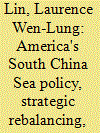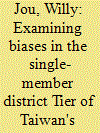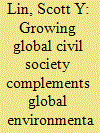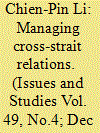|
|
|
Sort Order |
|
|
|
Items / Page
|
|
|
|
|
|
|
| Srl | Item |
| 1 |
ID:
126134


|
|
|
|
|
| Publication |
2013.
|
| Summary/Abstract |
The US South China Sea policy is designed to deny power transition in the Asia-Pacific. Strategic rebalancing has become America's Asia-Pacific Strategy for reassuring hegemonic stability and supporting its South China Sea policy. Practically, strategic rebalancing depends heavily upon naval diplomacy. As a result of us naval diplomacy, the DOC (Declaration on the Conduct of Parties in the South China Sea)-symbolized "ASEAN+China" mechanism is being eroded by the looming US-dominated neo-realistic framework, an indication that Washington's strategic rebalancing has secured preliminary success. Yet, the creditability of US naval diplomacy in the South China Sea ultimately rests upon the progress of the Navy's maritime strategy in the Asia-Pacific. Michael Mullen's idea of "landward push" of sea control resides at the core of the 2007 Maritime Strategy, of which the core operational mechanism is the Navy Expeditionary Combat Command (NECC). NECC is key to the AirSea Battle concept and naval diplomacy. The 2012 and 2013 Balikatan exercises have showcased the utilities of NECC and provided much edification: with the use of versatile naval diplomacy, the US Navy has insinuated Mullen's idea into the South China Sea, advanced AirSea Battle, facilitated strategic rebalancing, and reassured its South China Sea policy. If China fails to fully comprehend the progress of America's maritime strategy, it may end up wrestling with a far superior balancing coalition that is being created by the US.
|
|
|
|
|
|
|
|
|
|
|
|
|
|
|
|
| 2 |
ID:
126130


|
|
|
|
|
| Publication |
2013.
|
| Summary/Abstract |
Two elections to the Legislative Yuan have been held under a mixed parallel system. While there have been criticisms that this new set of rules leads to a considerable disparity between parties' vote and seat shares in the district tier, in so far as the new electoral system has been accepted and therefore treated as given by both parties and voters, its fairness should be assessed not by the degree of proportionality, but rather by examining various sources of potential bias. These include differences in electorate sizes and turnout rates across districts, and the efficiency by which votes for the main parties' candidates are distributed. The present study investigates how "fair" the functioning of Taiwan s new mixed parallel system was in the 2008 and 2012 legislative elections by simulating equal and reverse vote scenarios at the district level, and measuring the magnitude of each component of electoral bias. The results show that the operation of the electoral system entails no marked partisan bias, since it does not consistently confer an advantage to either of the main parties or camps.
|
|
|
|
|
|
|
|
|
|
|
|
|
|
|
|
| 3 |
ID:
126133


|
|
|
|
|
| Publication |
2013.
|
| Summary/Abstract |
Although the increasing influence of global civil society has been noted in environmental politics and this phenomenon is synonymous with global environmental governance, some questions remain: where does this change in mentality originate and through what forces, how are these forces motivated, and how do they continue to motivate the "environmental agenda"? A primary factor is the establishment of transnational institutions that stimulates the participation of global civil society in global environmental governance and how this participation has diminished government authority by reinforcing local loyalties with their viewpoints concerning the environment. Thus, the debate becomes how the interpretation of global environmental governance and "top-down" approaches affects and is affected by local practices in civil society. This study examines the growing importance of global civil society to the Lancang/Mekong fish catch- the world's largest inland fishery-and the dam project disputes concerning the Lancang/Mekong River. The following analysis concerns the influence of the rising global civil society on the effectiveness of these environmental governance entities. The analysis indicates that participation of the global civil society in the Lancang/Mekong dam decision-making process concerning the fisheries does not replace the traditional mechanism of governmental governance. Instead, the growing influence of the global civil society is compatible with operations of the governmental governance mechanism, complementing the function of global environmental governance.
|
|
|
|
|
|
|
|
|
|
|
|
|
|
|
|
| 4 |
ID:
126129


|
|
|
|
|
| Publication |
2013.
|
| Summary/Abstract |
For the legislative elections in 2008, Taiwan introduced a new mixed-member majoritarian (MMM) electoral system to replace the single non-transferable vote (SNTV) system that had been in place for half a century. The new MMM system is a sharp departure from the original SNTV system in several institutional designs. Whether the Taiwanese public is ignorant or fully aware of the new electoral system has attracted the attention of many Taiwanese scholars. By taking advantage of survey data conducted between 2007 and 2011, we aim to examine in this research the level of the Taiwanese public s awareness of the new MMM electoral system in the 2008 and 2012 elections, investigating whether most voters are knowledgeable of the new electoral system. We also test whether holding legislative elections concurrently with the presidential election influences the effect of political campaigns on people's learning of electoral knowledge. Furthermore, the extent to which people's knowledge of electoral systems influences their voting participation is also included in our analysis. The findings of this study indicate that the majority of citizens were not fully aware of the institutional components of the new MMM system in the 2008 and 2012 elections. We also confirm that political campaigns play an important role in enriching citizens' electoral knowledge. Citizens' knowledge of the electoral system rises as the election date approaches and declines after the election is held. Moreover, concurrent presidential and legislative elections did negatively impact the relationship between political campaigns and electoral knowledge. The learning effect of electoral knowledge in the 2012 concurrent elections was not as significant as that in the 2008 legislative election. In addition, our findings also reveal a positive relationship between electoral knowledge and voting participation, suggesting that citizens who are more knowledgeable of the electoral system were more likely to vote in the 2012 legislative election.
|
|
|
|
|
|
|
|
|
|
|
|
|
|
|
|
| 5 |
ID:
126131


|
|
|
|
|
| Publication |
2013.
|
| Summary/Abstract |
The relationship between Taiwan and China has swung between periods of conflict escalation and de-escalation during the past two decades. In recent years, a notable trend of reconciliation has been observed amidst rising Taiwanese identity/attachment and public apprehension in dealing with China. This paper examines how the leadership in Taiwan frames public discourse and manages the tenor of cooperation and competition in public communication. Examining public speeches and interviews from 2004 to 2011 through the lens of value analysis reveals not only the substantive differences, but also the commonalities in rhetoric styles shown by Chen and Ma and their respective administrations. When facing different audiences, both administrations calibrate and adjust their messages. Sharp attacks against China are usually reserved for domestic audiences, while Taiwan's aspirations and accomplishments are showcased for foreign audiences. Furthermore, while their language toward China may be different in tenor of denunciation and accusation, the Chen and Ma administrations exhibit a similar tendency to appeal to the sense of Taiwan identity derived from in-group bias.
|
|
|
|
|
|
|
|
|
|
|
|
|
|
|
|
| 6 |
ID:
126132


|
|
|
|
|
| Publication |
2013.
|
| Summary/Abstract |
Japanese foreign policy since the late 1980s has exhibited many signs of liberal internationalism: a generous development assistance package despite its economic malaise, an expanded presence in international peacekeeping and peace-building missions, and a multi-faceted, people-centered approach to international security. This article, however, draws attention to the (non)liberal character of Japanese activism by shedding light on Japan's entanglement in democracy assistance, a trademark liberal internationalist project. Two features stand out in this juxtaposition. First, democracy assistance has been seen as supplementary-rather than parallel-to the peace and development initiatives in Japan's diplomatic repertoire. Second, when democracy was indeed played up, the act nonetheless exposed the myriad innate contradictions between the liberal paradigm and Japan's nationalist impulses that transpired in its diplomatic offensives. Humanistic as it can be at times, Japan's global outreach is non-liberal at best because it is intellectually informed and motivated by a confluence of nationalist resurgence and realist power considerations.
|
|
|
|
|
|
|
|
|
|
|
|
|
|
|
|
|
|
|
|
|